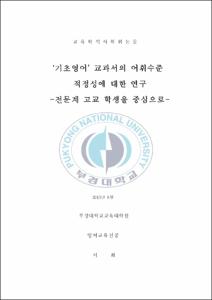‘기초영어’ 교과서의 어휘수준 적정성에 대한 연구-전문계 고교 학생을 중심으로
- Abstract
- In Foreign language learning, knowledge of vocabulary is fundamental and important. Nevertheless, Korean English teachers have little interest in improving students‘ vocabulary learning, and this is especially true for technical high school students. What is worse, the level of previous textbooks was too high for students to study even with teachers during class. Fortunately, as part of the ‘2009 Revision Education Process’, three ‘Basic English’ textbooks, targeted primarily technical high school students, were published for students with low levels of vocabulary ability. This thesis will examine the vocabulary in the main text parts of each textbook to determine if the level of vocabulary of technical high school students using three ‘Basic English’ textbooks is suitable for the textbooks.
The purpose of this study is to investigate the Adequacy of Vocabulary Levels in three ‘Basic English’ Textbooks, focusing on technical high school students. For the sake of achieving the goal of this study, the following research questions were examined:
1) How is the level of vocabulary in three ‘Basic English’ textbooks for technical high school students?
2) What is the difference in the level of the English vocabulary between technical high school students and academic high school students, and is the level of the vocabulary in ‘Basic English’ textbooks appropriate for technical high school students?
There are two subjects in this study. The first one is the students of two types of high schools who appeared to be somewhat different in their level of English ability. And the other is the main texts of three ‘Basic English’ textbooks which are analyzed, in detail, into the K1, K2 and K3 percentage of the vocabulary using the BNC VocabProfile Program
The findings about the study were as follows:
As for the first research question about the level of vocabulary in the three ‘Basic English’ textbooks, the analysis reveals that the level of vocabulary in the textbooks consists of around 85% of the very basic 1000 words in each textbook. This does not show any particular distinction among three ‘Basic English’ textbooks and meets the recommended vocabulary level of 2009 Revision Education Process. That is to say, the vocabulary level of the three ‘Basic English’ textbooks is almost the same and a lot easier than that of previous books the students have studied with.
Concerning the second research question, the test between-subjects in each high school shows a big difference in the vocabulary ability which is far more than expected. Therefore, the vocabulary level of new readjusted ‘Basic English’ textbooks is a lot higher than that of the students in the Technology High School. Therefore, it is difficult for them to study the three 'Basic English' Textbooks.
The findings of this study suggest that new research on the average of the vocabulary level of present technical high school students be performed, and furthermore, based on those results, new determinations should be made about the level of technical high school students that these three ‘Basic English’ textbooks are most appropriate for. Additionally, identify which vocabulary level of textbooks that the targeted subject of this study fits with.
- Issued Date
- 2013
- Awarded Date
- 2013. 8
- Type
- Dissertation
- Publisher
- 부경대학교
- Affiliation
- 교육대학원
- Department
- 교육대학원 영어교육전공
- Advisor
- 오준일
- Table Of Contents
- Abstract ⅵ
I . 서론 1
1.1 연구의 필요성 및 목적 1
1.2 연구 질문 4
1.3 연구의 제한점 5
Ⅱ. 연구의 이론적 배경 7
2.1 어휘 7
2.2 2009 개정 영어과 교육과정 13
2.3 전문계 고교의 영어학습 부진아 17
2.4 선행연구 19
Ⅲ. 연구 방법 23
3.1 연구대상 23
3.2 연구도구 28
3.3 자료 수집 및 어휘 분석 절차 33
Ⅳ. 결과 및 논의 41
4.1 교과서 어휘 분석 41
4.2 어휘시험 수준비교 분석 55
4.3 교과서 어휘 난이도 분석 61
Ⅴ. 결론 및 제언 70
5.1 결론 70
5.2 제언 72
참고문헌 74
- Degree
- Master
- Files in This Item:
-
-
Download
 ‘기초영어’ 교과서의 어휘수준 적정성에 대한 연구-전문계 고교 학생을 중심으로.pdf
기타 데이터 / 1.07 MB / Adobe PDF
‘기초영어’ 교과서의 어휘수준 적정성에 대한 연구-전문계 고교 학생을 중심으로.pdf
기타 데이터 / 1.07 MB / Adobe PDF
-
Items in Repository are protected by copyright, with all rights reserved, unless otherwise indicated.